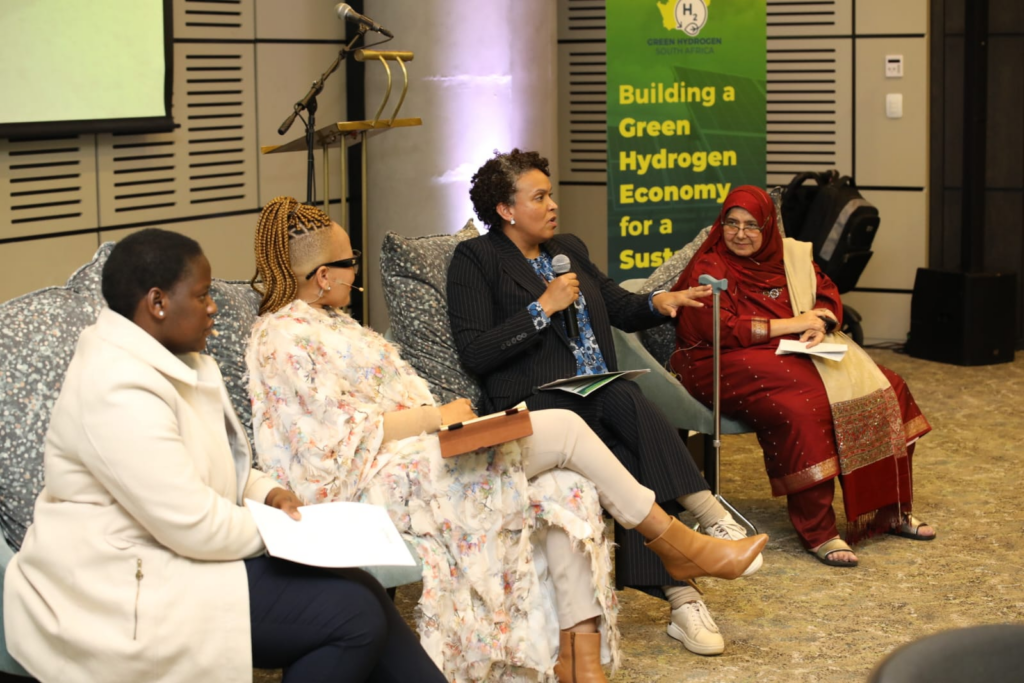As the world increasingly recognises green hydrogen and renewable energy as the sustainable energy of the future, women in South Africa’s energy sector are demonstrably determined to participate at the frontline of discussions shaping this emerging economy. This is underpinned by the need to challenge the predominant narrative where women continue to experience more barriers to entry, retention and progression in STEM (science, technology, engineering, maths) related professions, despite the important role they play in economic growth and inclusive development.
The networking evening
On the evening of 20th July 2023, and as a precursor to Women’s month in August in South Africa, close to 70 women working in energy and spanning the public and private sectors gathered at a networking event to discuss new initiatives and strategies for women in the sector. The event provided a platform for women to expand their professional networks, share knowledge and build relationships and partnerships necessary to advance in this male dominated sector.
The event was hosted by Green Hydrogen South Africa (GHSA) and themed: “Green hydrogen and renewables: a catalyst for women’s empowerment in South Africa”. GHSA is a multi-stakeholder initiative that promotes South Africa as a leading green hydrogen producer and investment destination of choice. It is led by The Presidency of South Africa and implemented in cooperation with Deutsche Gesellschaft für Internationale Zusammenarbeit (GIZ) GmbH. GHSA is working to pave the way for a new generation of women to participate in South Africa’s sustainable energy economy.
Welcome & keynote address
Ms Shaakira Karolia, Head of Infrastructure Finance & Investment at Infrastructure South Africa (ISA) delivered the welcome address by the Presidency. She emphasized the importance of green hydrogen in global climate change efforts noting that the International Energy Agency (IEA) estimates that up to 10 to 20% of the global energy mix by 2050 will need to be made up by green hydrogen to help meet the 1.5 degree target. Ms Karolia further noted the importance of such networking events as an important means to enhance women’s opportunities to advance in this and similar sectors.
Following the warm welcome by the Presidency, Dr Rebecca Maserumule, the Chief Science and Technology Representative for Hydrogen and Vaccines at South Africa’s Department of Science and Innovation (DSI) delivered the keynote address on behalf of the Deputy Minister in The Presidency, Nomasonto Motaung who was unable to attend the event.

Influential women inspired audience
The audience was then treated to three heart-to-heart conversations with women of influence in the sector. The session was facilitated by the networking program director Kaashifah Beukes, CEO at Freeport Saldanha.
Among the women were Shirin Motala, Director at the Human Sciences Research Council (HSRC), which is the entity responsible for implementing an internship programme that is equipping young unemployed women with industry skills for the green hydrogen sector; Dr Rethabile Melamu, CEO at the South African Photovoltaic Industry Association (SAPVIA) and Ms. Palma Maluleke, Chief Engineer at City Power Johannesburg. The influential women engaged the audience on inspirational topics including paving the way for the next generation of women leaders in sustainable energy, women in leadership and navigating through a (still) male-dominated renewable energy and emerging green hydrogen space.
Important takeaways drawn:
- Women encouraged to push for practical change so as to change the narrative on the same challenges that have spanned decades
- Women supporting other women
- Women can support each other wherever they are and do not have to entirely depend on women in leadership roles to effect change
- Women can look to men in the sector as allies – men can be supportive
The event was the second of its kind since last year’s South African Green Hydrogen Summit (SAGHS) networking breakfast for women. As South Africa is working hard to ensure that the energy transition efforts deployed are just and equitable when addressing our climate goals, women have a vital role to play in this journey both now and in the future. Networking opportunities such as this one play an important role in expanding access to and sharing knowledge necessary to keep women just as informed as their male counterparts.
For more information, contact Susan Byakika.
